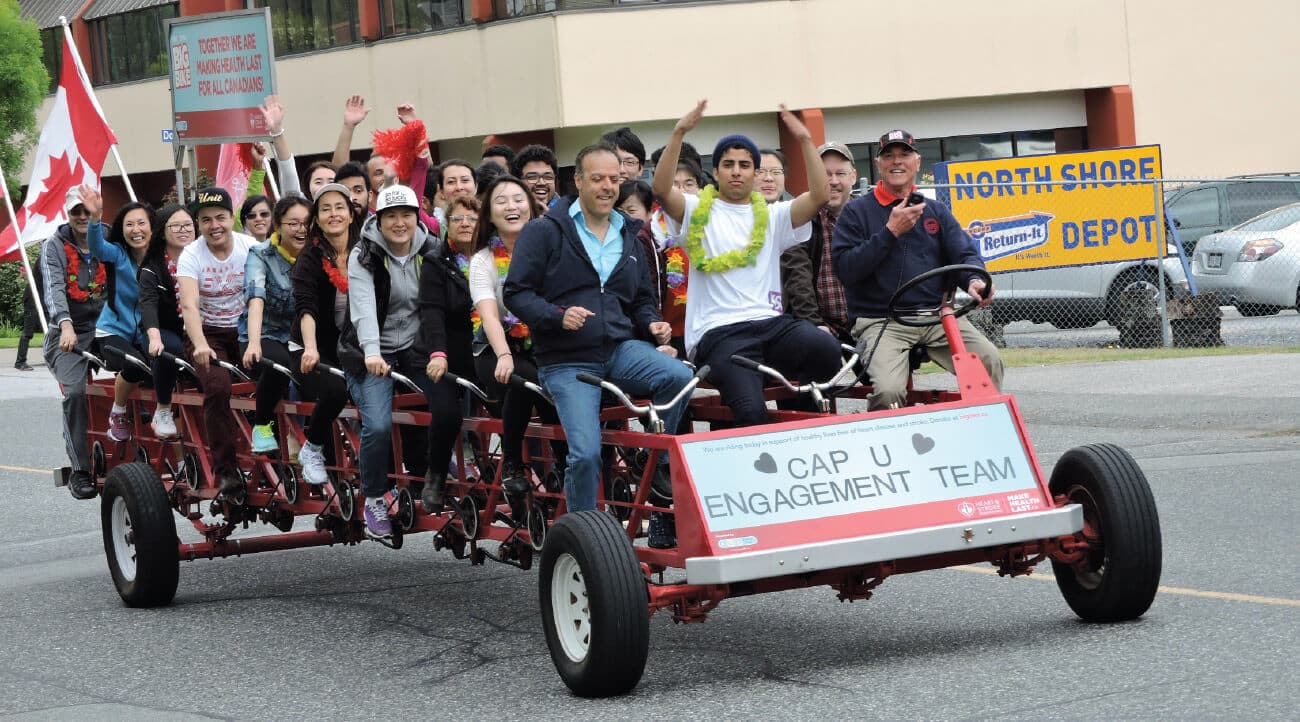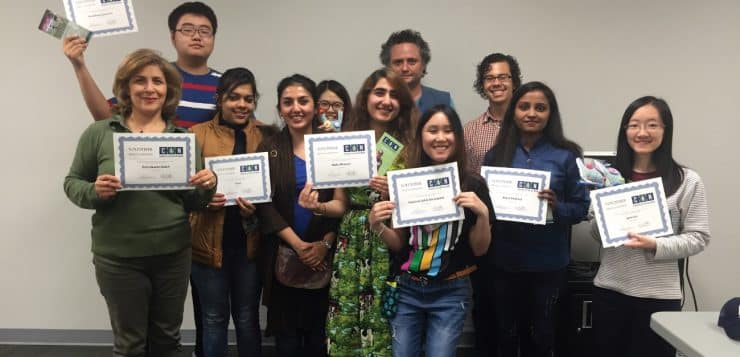“Giving causes me happiness. I appreciate that giving is the best gift ever for volunteer work.” For this young student from Taiwan, her experiences doing volunteer work during her English studies in Vancouver have not only helped her improve her English speaking skills but also her feeling of connectedness with the community at large.
International and domestic students in our English for Academic Purposes (EAP) department at Capilano University are required to participate in community engagement. They receive course credit for this participation, and by doing so, they encounter many different, wonderful, strange, exciting, and heart-warming experiences.
The goal of community engagement is to encourage students to participate in activities and events outside of the classroom. We realize that when students who are learning English have opportunities to interact with native English speakers, not only do they develop their language skills but also they discover that they can make new friends, learn about Canada, contribute to Canadian society, and ultimately, experience personal growth.
One student from China had been struggling in her English classes because of her weak speaking and listening skills. Outside of class, she stayed with other Chinese-speaking friends, and as a result, was not able to improve her English. She was also very shy, so in the classroom, she was reluctant to speak with classmates from other countries. She failed one semester and was placed in my class to repeat the same level.
For her community engagement work, I encouraged her to participate in activities on campus. After she began to volunteer at our university’s intercollegiate basketball games, she discovered to her delight that being pushed out of her comfort zone actually helped her develop self-confidence: “I was really nervous to talk with native speakers. However, after I took the opportunity of CE (community engagement) and talked with native speakers, I found out that they are friendly and some of them are shy. Now, I have more confidence while I’m speaking English.”
Apart from improving their English and earning course credit, our students also realize that doing volunteer work can have long-term benefits. For example, after volunteering at an organization that provides support to autistic children, another student reflected that it was “great to make an incredible difference in their life by doing small, different things. I got to learn many different things that can be useful in my life and in my future.” This student from Saudi Arabia plans to study Early Childhood Care and Education (ECCE) next semester.
Students also delight in the social aspects of volunteering. Many of the positions allow volunteers to participate as a team. For example, on one occasion, a group of students from our university’s academic programs invited my EAP students to join them for a day of work at Canucks Autism Place. At the start of the day, we were shown a video that described how the children and their families have benefitted from the support of volunteers.

While working together, the EAP students engaged in conversations with the students from the academic programs – in English. One of my Thai students told me that she enjoyed most the chance to chat with other volunteers because she was “exposed to many kinds of things such as the stereotype of each country, the attitude towards volunteer[ing]in a different country, as well as the people’s accent in a different country.”
Other students also gain a stronger understanding of their role as citizens in our society. One young man, an immigrant from Iran, wrote, “[W]ith my work serving breakfast to the homeless, I have learned how lucky I am to always have food on the table. I have also appreciated how thankful people are for what they have and the difference a breakfast can make.”
Still other students discover personal growth through participating in community engagement, and they marvel at how their own outlook has changed. A student from China reflected, “Community engagement is one of the significant events in my life. I didn’t have any experience of [sic]doing volunteer work in my own country, and after I have done some volunteer jobs, it influences my opinion about volunteer work.” He went on to describe how his pre-conceptions about homeless people had been changed through his volunteer experiences.
Sometimes, students encourage one another to participate in volunteering. One of my students from China, whose young daughter was born with a heart condition, felt very strongly about participating in a fundraising event organized by the Heart and Stroke Foundation. In response to his friend’s reluctance to volunteer, my student pointed out that, as new citizens, they had an obligation to participate in Canadian society. He explained, “Because it’s your duty, man!”
Perhaps the value of community engagement is best summed up by one student who is originally from Korea: “Now, I think that volunteer work is the greatest job in the world because most volunteer associations require only enthusiasm and passion.”
For our students, enthusiasm and passion combine to help them learn and grow. They develop their language skills and gain a better understanding of Canadian culture. More important, they learn that community engagement is about participating, contributing, learning, growing. It is about Community. It is about Engagement.
Contributed by:
Carrie Jung, Faculty, EAP department, Capilano University
Chair, Community Engagement Committee








Discussion10 Comments
I want make the volunteer. How make
How do l volunteer?
merci pour les informations
thanks a lot
merci
thanks so much for the post
I’m facing some challenges with my homework, and your information caught my attention. If there are any solutions to make student life easier, I’d be delighted to know. Perhaps you have some recommendations or know someone who can offer assistance?
I’m facing some challenges with my homework, and your information caught my attention. If there are any solutions to make student life easier, I’d be delighted to know. Perhaps you have some recommendations or know someone who can offer assistance?
Your post is a great reminder of the challenges philosophy students face with essay writing. I have personally found https://assignmentgeek.com/philosophy.html to be a dependable service that provides expert support for my philosophy assignments. I hope other students also know about their services!
“I was really nervous to talk with native speakers” This is also an issue I am extremely concerned about when participating in similar activities. But that’s what we should face. If this problem is not solved, all difficulties will not pass.